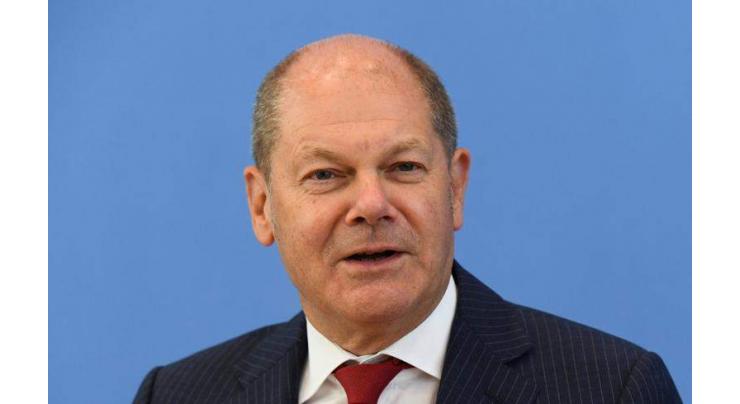
Coal Exit, Weed, Sovereign Europe: New German Govt's Roadmap
Faizan Hashmi Published November 24, 2021 | 11:31 PM

The centre-left-led alliance forming Germany's next government on Wednesday presented their plans for Europe's biggest economy in a coalition agreement, touching on issues from climate protection to foreign policy and cannabis
Berlin, (APP - UrduPoint / Pakistan Point News - 24th Nov, 2021 ) :The centre-left-led alliance forming Germany's next government on Wednesday presented their plans for Europe's biggest economy in a coalition agreement, touching on issues from climate protection to foreign policy and cannabis.
Here are the main points agreed on by the Social Democrats, ecologist Greens and liberal FDP.
- No new debt - Germany's no-new-debt rule had been suspended in the coronavirus pandemic, allowing the government to borrow billions to finance its way out of the crisis.
But the country's next government -- known as a "traffic-light" coalition because of the parties' red, green and yellow colours -- plans a return to the rule that is anchored in the German constitution.
In their agreement, they pledged to reinstate the so-called debt brake by 2023.
Maintaining the debt brake was a red line for the FDP, and Social Democrat Finance Minister Olaf Scholz -- who will be Germany's next chancellor -- has also long been an advocate of the rule.
The parties also agreed to not raise taxes during their mandate, according to a tweet by FDP leader Christian Lindner -- a win for his party which has refused to raise any fiscal pressure on taxpayers.
- Minimum wage, vote at 16 - In return, the Social Democrats secured their electoral promise of raising the minimum wage to 12 Euros ($14) from the current 9.60 euros.
All three agreed to lower the voting age to 16 -- something likely to favour the Greens and FDP which have younger supporters as opposed to Angela Merkel's conservatives, who are largely backed by Germany's army of pensioners.
- Climate - The Greens' main win came in the form of an accelerated exit from coal energy, which is to be brought forward by eight years to 2030.
The parties also agreed to "further develop" the country's current climate protection law in 2022, and to "bring about all necessary laws, regulations and measures" on this front.
- Sovereign Europe - Foreign policy is dealt with in broad strokes in the document.
The parties however emphatically say they "want to raise Europe's strategic sovereignty" -- likely to please the continent's second biggest power France, which has made this a priority of its EU presidency beginning in 2022.
The transatlantic relationship will remain a "central pillar" for Germany, and NATO is an "indispensable element" for the country's security, the text says.
And potentially grating to Poland or Hungary, the parties want "an EU which protects its values and rule of law internally and externally".
Presenting the coalition deal, Annalena Baerbock, the co-leader of the Greens who is poised to become foreign minister, promised to put human rights back at the centre of German diplomacy and advocated more firmness towards Russia and China.
- Legalise it - Recreational use of cannabis will be legalised under the new government.
"We will introduce the controlled distribution of cannabis to adults for consumption purposes in licensed stores," the parties say in the document.
"This will control the quality, prevent the circulation of contaminated substances and ensure the protection of minors." The Greens and FDP have long been pushing to legalise cannabis, while the SPD has proposed testing regulated distribution of the drug in pilot projects.
- Abortion - The parties have pledged to abolish paragraph 219a, a controversial piece of Nazi-era legislation that makes it illegal to advertise abortion services.
"Doctors should be able to provide public information about abortions without fear of prosecution," they say in the document.
Related Topics
Recent Stories

Iranian President arrives in Lahore today

Currency Rate In Pakistan - Dollar, Euro, Pound, Riyal Rates On 23 April 2024

Today Gold Rate in Pakistan 23 April 2024

Islam enlightened world with its teachings about knowledge: Dr Jamileh

Record London close as oil prices drop on easing Middle East fears

TV tower in Kharkiv struck as Russia captured village

LCCI language courses from May 1

Governor for service oriented governance in Punjab

Survivors tell of panic at C.Africa river boat disaster

Enrolment campaign, awareness walk held in Lower Chitral

“Say no to plastic- yes to tress” campaign kicks off in Attock

'PML-N secures people's trust in by-polls'
More Stories From World
-
Tensions flare at US universities over Gaza protests
35 minutes ago -
Taiwan hit by dozens of strong aftershocks from deadly quake
45 minutes ago -
Trump faces contempt hearing for comments on witnesses
54 minutes ago -
Malaysia military helicopters crash, killing 10
54 minutes ago -
China issues highest-level rainstorm warning in southern Guangdong: weather agency
54 minutes ago -
Asia hit hardest by climate, weather disasters in 2023:UN
54 minutes ago
-
Murray buzzer-beater lifts Nuggets over Lakers, Knicks stun Sixers
54 minutes ago -
Musk lashes Australian order demanding X remove stabbing videos
55 minutes ago -
In world first, Venice to trial day tickets
55 minutes ago -
Highest-level rainstorm warning issued in south China's Guangdong
55 minutes ago -
Rwandan LGBTQ fashion designer plans comeback after arrest
1 hour ago -
EU lawmakers to greenlight new spending rules
3 hours ago